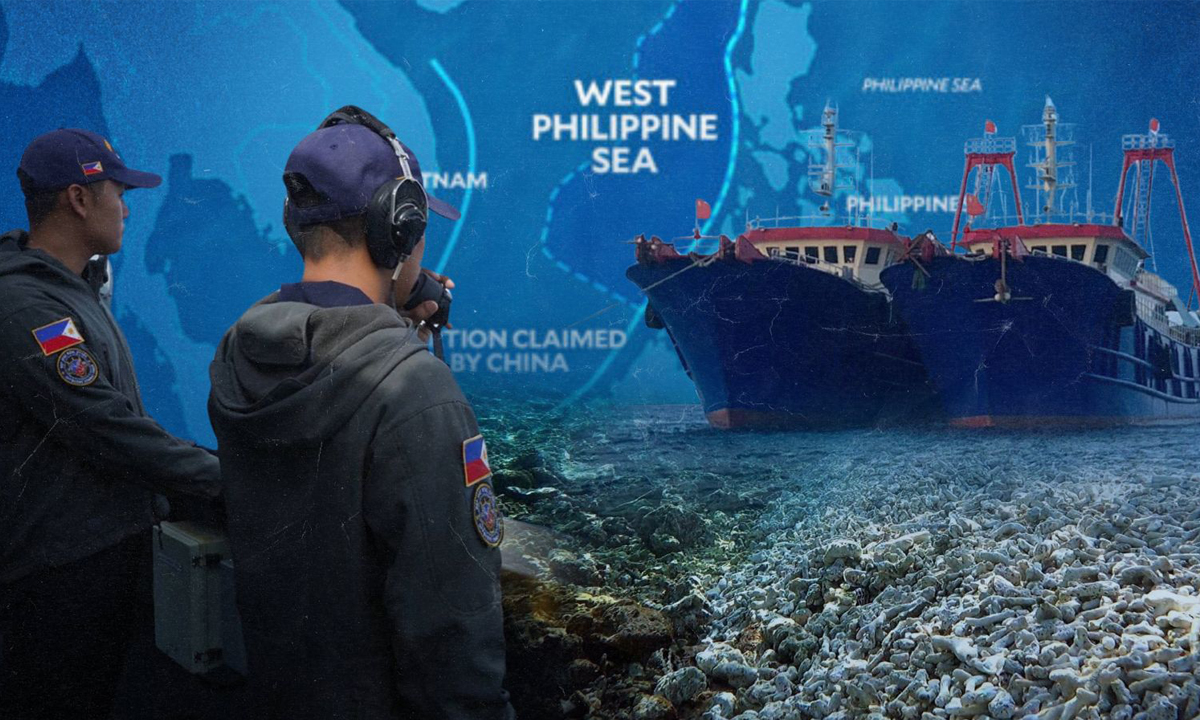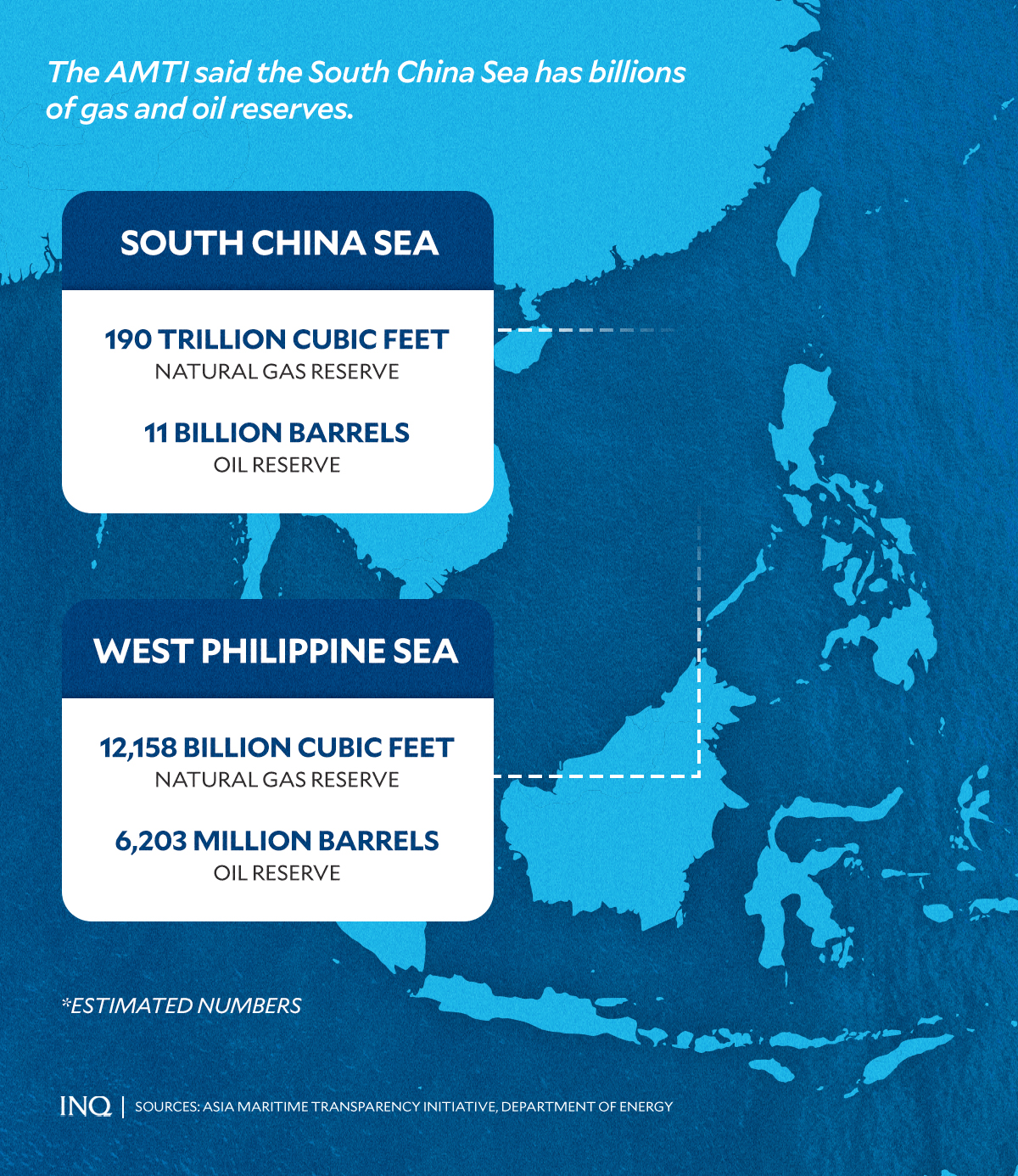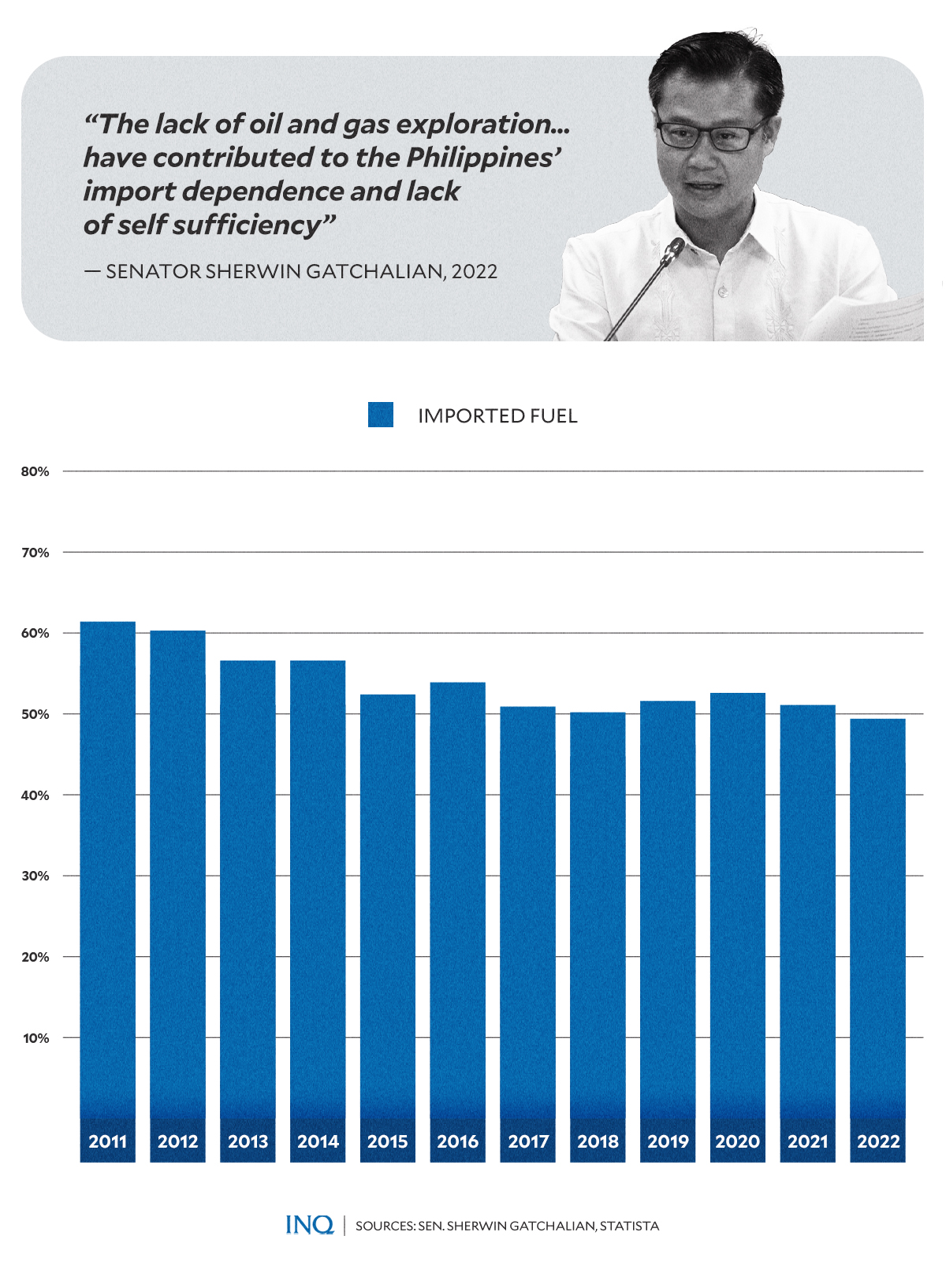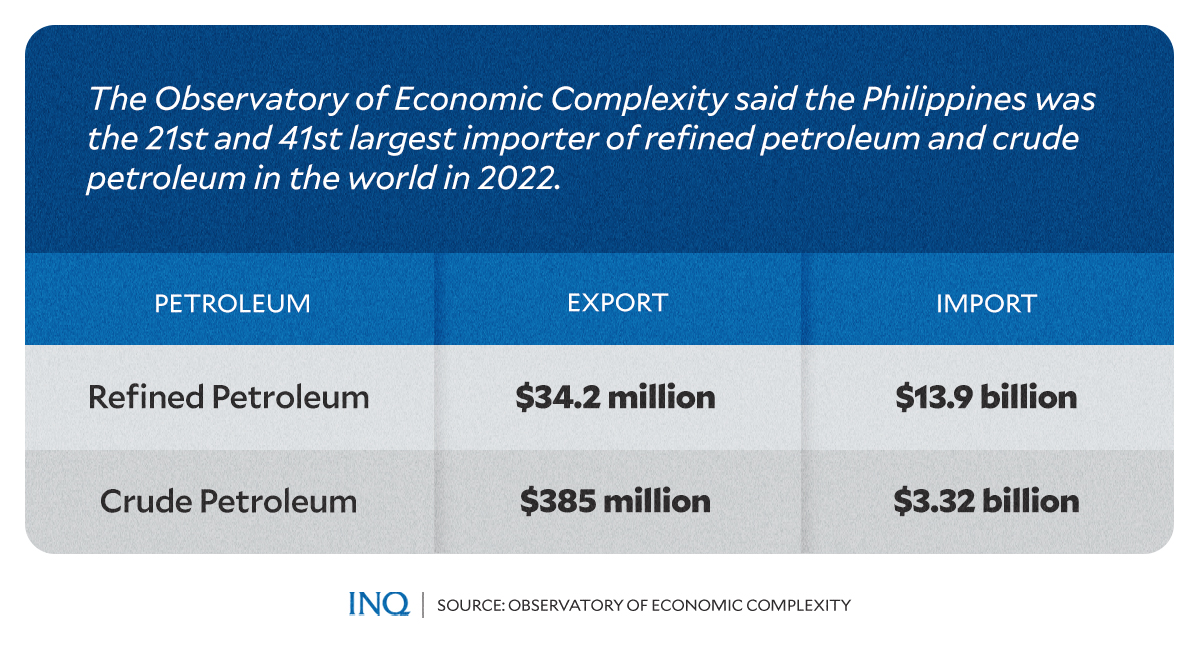China invasion of West Philippine Sea: Root of all evil is access to oil, gas

West Philippine Sea composite image by DANIELLA MARIE AGACER from file photos from INQUIRER.net, Agence France-Presse, and Philippine Coast Guard
MANILA, Philippines —With the Malampaya gas field’s expected depletion in 2027, a think tank stressed that the Philippines has to “develop new sources of energy” to keep Luzon’s lights on and prevent the economy from stagnating.
Felix Chang, a senior fellow at the Foreign Policy Research Institute, said that with the Philippines’ desire to phase out its coal-fired power plants and the relatively high cost of renewable ones, “the only reliable and cost-effective source of energy is natural gas.”
It was last year when President Ferdinand Marcos Jr. signed the renewal agreement for the Malampaya Service Contract No. 38, extending the production for another 15 years, or until Feb. 22, 2039. As the Department of Energy (DOE) said, this will ensure that the remaining gas reserves are explored and efficiently used.
READ: Philippine natural gas future uncertain with Malampaya depletion
With the contract renewal, the consortium is required, too, to conduct a minimum work program consisting of geological and geophysical research and the drilling of at least two deep water wells from 2024 to 2029, the Sub-Phase 1, the DOE said in a statement in 2023.
Article continues after this advertisementThe lead company in the Malampaya Consortium, Prime Energy, has vowed to drill a third well, too.
Article continues after this advertisementThe DOE pointed out that the work program is geared at unlocking the potential both in the existing gas field, which is about 80 kilometers off the northwest coast of the island of Palawan, and prospect areas that are close to Malampaya, with the DOE saying that 210 billion cubic feet (CF) of gas reserves can still be developed.
But Chang stressed that the Philippines has the West Philippine Sea (WPS), too.
The problem, however, is that most energy companies have refrained from bidding for service contracts not because of fear that the offshore blocks will not yield viable natural gas reserves, but because of the risks that China’s aggression brings.
According to data from the Asia Maritime Transparency Initiative (AMTI) of the Center for Strategic and International Studies, the whole South China Sea (SCS) has billions of gas and oil reserves. Most of the SCS is being claimed by China through its illegal nine, now 10-dash line.
The SCS, AMTI said, has an estimated 190 trillion CF of natural gas reserve and 11 billion barrels of oil reserve. As the DOE said, an estimated 12,158 billion CF of natural gas reserve and 6,203 million barrels of oil reserve is in the WPS inside the Philippines’ exclusive economic zone (EEZ) as of 2021. There are only five petroleum service contracts in the WPS.
International law recognizes a country’s EEZ as the area where such country has the exclusive right to tap natural resources.
Fighting for resources
Back in 2021, Sen. Sherwin Gatchalian filed a Senate resolution seeking to establish the oil and gas potential in the WPS, saying that “the lack of oil and gas exploration […] have contributed to the Philippines’ import dependence and lack of self sufficiency.”
He said that with worldwide energy shocks, “it is important for us to ascertain the oil and gas potential in the West Philippine Sea for the country to have some level of stability and protection from the tumultuous geopolitical conflict in foreign countries that has severely impacted local energy prices.”
This won’t be easy, though.
As stressed by Raymond Powell, a fellow at Stanford University’s Gordian Knot Center for National Security Innovation, China has prevented the Philippines from exploiting its own oil and gas reserves inside its EEZ through the “effective use of threats and coercion.”
READ: Aggression in West PH Sea: China’s maritime ‘Great Wall’ plan
He told INQUIRER.net in a message on Facebook that this has “essentially made it seem too risky or costly to engage in legitimate [oil and gas] exploration activities” in the WPS, even when the Philippines has the exclusive right over its resources inside its EEZ, based on a 2016 decision by the Permanent Court of Arbitration.
This did not happen in a year or two, though, with Powell saying that the past administration “was motivated by a belief that the primary threat to Philippine independence and self-government came from the United States, and that the only alternative to working with China was open conflict.”
“He (Rodrigo Duterte) thus went into negotiations with China having already shown his hand and given away his best leverage—the US alliance. This allowed China to demand concessions knowing that he had little left with which to push back,” he said.
Strong presence
Powell pointed out that over the years, China has been taking over SCS features inside Philippine territorial waters, such as Whitsun (Julian Felipe) Reef, Sabina (Escoda) Shoal, and Rozul (Iroquois) Reef “through a gray zone tactic we call ‘rafting’, which is the positioning of floating outposts.”
These outposts, he said, are comprised of supposed “fishing” vessels that don’t actually fish, but simply tie themselves together to establish a semi-permanent presence. Rozul Reef is located at the southern end of Reed (Recto) Bank, which is believed to be rich in oil and gas reserves.
For Joshua Espeña, vice president of the think tank International Development and Security Cooperation, China is denying the Philippines access to its rich resources through:
- Anti-access and area denial operations in WPS
- Use of radio challenges by Chinese vessels inside Philippine EEZ
- Dangerous naval maneuvers and interdiction against Philippine vessels
- Water cannon attacks on Philippine vessels by Chinese coast guard and militia ships
- Use of People’s Liberation Army vessels to tail and target Philippine coast guard and navy ships
READ: PH condemns China’s ‘irresponsible’ actions in West Philippine Sea
“It’s also plausible that its medium-range cruise missile systems from China’s reclaimed man-made, dual-use islands might be used to conventionally deter the Philippine government forces from establishing a ‘security box’ and allow Manila to freely exploit resources on its own,” he told INQUIRER.net.
“Strategically, China wants to impose fait accompli conditions on the Philippines,” Espeña said. Fait accompli, as defined by Oxford Dictionary, is something that has already happened or been decided before those affected hear about it, leaving them with no option but to accept it.
READ: Gov’t to ramp up West PH Sea patrols amid reported reclamation
Espeña pointed out that it is possible that China has already exploited some of the areas in the WPS given the mounting evidence of environmental damage in the area.
He said the destruction is a possible depiction of the “scorched earth” strategy, which means “damaging geographical areas to render them useless to enemies in the future.”
READ: ‘Irreparable harm’: China intrusion’s impact on West Philippine Sea ecosystem
“The implication of this is to shame its Filipino counterparts and signal that this area is not worth fighting for,” he said, but stressing that it is no excuse for the Philippines not to find ways forward to establish a credible presence to possibly drill the seabed for new oil and gas deposits.
Import-dependent PH
Based on data from the Observatory of Economic Complexity, the Philippines was the 21st and 41st largest importer of refined petroleum ($13.9 billion) and crude petroleum ($3.32 billion) in the world in 2021. The Philippines only exported $34.2 million and $385 million worth of refined and crude petroleum that year.
As of 2021, Gatchalian said the Philippines imported 98 percent of its petroleum products, making its energy self-sufficiency rate fall from 61.4 percent in 2011 to 50.9 percent in 2017; 50.2 percent in 2018; 51.6 percent in 2019; 52.6 percent in 2020; 51.1 percent in 2021; and 49.4 percent in 2022.
As pointed out by Espeña, “any state that is willing to throw its cards at sea tells us so much about its motives for using the sea for itself.” He said there is “no doubt that the potential blessings of trillion-dollar worth of oil and natural gas buried underneath the seas will be contested.”
“China’s booming urban-centric, (cheap) export-oriented economic model
resonates with the potential food and energy sources mentioned in the contested sea,” he said, stressing that the entire SCS holds10 percent of the world’s fishing resources.
He said that “the Filipino struggle on the West Philippine Sea derives from territorial integrity to cap its development goals.”
“It needs the food and energy resources in the West Philippine Sea to go beyond the current state that the country has been experiencing for the past decades,” Espeña added.
“Developing the economy means securing its archipelago,” said Espeña, a lecturer at the Polytechnic University of the Philippines. So “whether great power or not, both countries are needy.” It’s “just that the other is much able to throw its weight around at the other’s expense.”
“Given that China is hellbent on its great power ambitions, the Philippines would have to live in dangerous times of drilling the seabed while denying it to Beijing—a no-easy feat for the rest of the time,” Espeña said.
“This will require a continuous effort to develop itself and with the help of its allies and partners as appropriate,” he said.
For comprehensive coverage, in-depth analysis, visit our special page for West Philippine Sea updates. Stay informed with articles, videos, and expert opinions.


